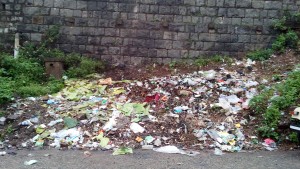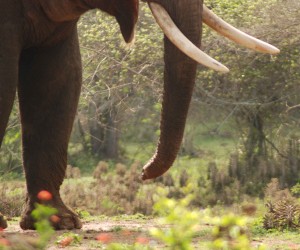The road to hell is paved with good plastic intentions

On the road to Kotagiri
When you live in the middle of the Nilgiris Biosphere Reserve, you need to be very careful with plastic because herbivores eat plastic bags and die of intestinal occlusion. In spite of the righteous boards “Plastic-free Nilgiris” placed on each road entering the Nilgiris, locally produced items are conscientiously wrapped in a layer of plastic and then delivered in a polythene bag thought to be cotton. Industrial products, of course, are almost always packaged in plastic. A single household produces maybe 1 kg of plastic per week.
I thought that, if plastic is produced in this region, it must be “treated”. As it happened, not at all. Plastic is burned by villagers or buried or left. Toxins released into the air contaminate plants, soil, surface water and groundwater. This can result in pollutants being absorbed by food crops, vegetation. Dioxins and furans occur as byproducts. Dioxin, is linked to cancer in humans, and dioxins and furans both accumulate in animal tissue. Reported effects on birds and fish, include increased mortality, decreased growth, reproductive failure and birth defects.
The “Plastic-free Nilgiris” campaign is supposed to suggest that this region forbids the use of plastic, which would be unattainable. But what it actually means is that the plastic problem is not addressed. It kills humans with cancer, pollutes the Ooty carrots and Nilgiris tea, and whatever is exposed to it. Who cares?
Plastic is a resource that can be reused and preferably less used. But as long as there is no real action, waste of resources, human lives and biodiversity will continue. The roads to Ooty with boards posting good intentions take us to hell. Too bad for the Biosphere Reserve.
Jean-Philippe Puyravaud.

